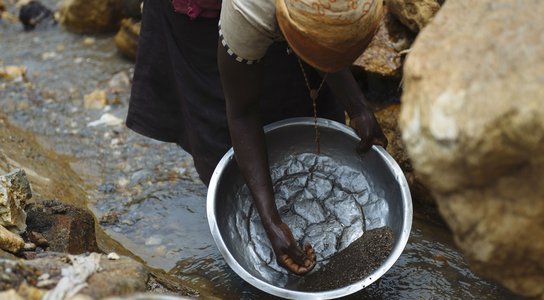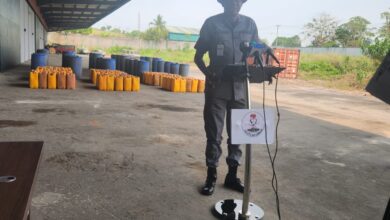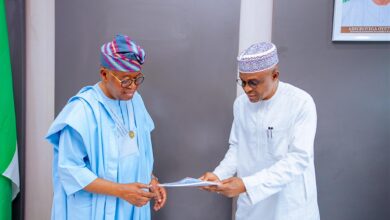African CSOs Express Concerns Over Lithium Extraction In Communities, Just Energy Transition
... Urge Groups, Locals, Others To Resist 'Energy Colonialism,' Protect Their Environments

By Edu Abade
A coalition of civil society groups in Africa have expressed grave concerns over the extraction of Lithium in Nigeria and the African continent, saying the way and manner in which illegal miners and their foreign counterparts go about mining even beyond designated locations is reminiscent of happenings in the oil and gas industry.
They also lamented the absence of government oversight functions in the mining sector, especially in Nasarawa, Ekiti, Kogi, Kwara Cross River and Edo states, where Lithium has been discovered in commercial quantities.
This was the verdict of participants at a Webinar titled: Voices From Mining Communities: Exploring the Complexities of Lithium Mining in the Just Transition Discourse, organized by the Community Development Advocacy Foundation (CODAF), Renevlyn Development Initiative (RDI), Global Alliance for Incinerators Alternative (GAIA), Africa Coal Network (ACN) and the Centre for Natural Resources Governance (CNRG) in Zimbabwe.
In his welcome address at the virtual meeting held on Wednesday, May 29, 2024, Executive Director of CODAF, Richard Benin, pointed out that polluters merely changed their approach to environmental devastation, adding that the activities of mining corporations have exacerbated the environmental and socio-economic challenges of community people.
“They invest more in dirty energy sources, thereby causing more harm to nature. There is no just transition without environmental justice and protection of the ecosystems, and so, energy colonialism must be resisted,” he said.
A member of the Global Advisory Hub of GAIA and Co-Founder of CODAF, Ubrei-Joe Maimoni, who spoke on The True Essence of a Just Transition, stressed that mining companies and the government must uphold indigenous rights and communities consent, prioritize circular economy solutions, provide stringent regulations and accountability, ensure equitable access to clean energy and robust environmental protection for host communities.
“By prioritizing these principles, the transition to renewable energy can be achieved without replicating the injustices and environmental destruction of the fossil fuel era.
“It requires a holistic approach that centers on human rights, environmental protection and equitable access to clean energy for all. The just transition does not mean that we should dig our way out of climate crisis, therefore, we must stop digging more pits of hell,” he stated.
Speaking, a board member of RDI, Tobias Lengs Dapam, gave a grim description of the situation in Nasarawa State, adding that the miners usually deny people (they consider as new to the locations) access to the mining sites and that the mining pits are very many and deep, which constitute environmental hazards in the communities.
Also in his intervention titled: Why Nigeria is Heading on the Path of Doom, Executive Director of RDI, Philip Jakpor, recalled that on Friday, May 10, 2024 President Bola Ahmed Tinubu met two Chinese companies – Avatar New Energy Materials Company Limited which processes 4000 tons of lithium per day in Nasarawa State and Canmax Technologies the Chinese company responsible for over 30 percent of global battery material production, which announced a new investment of $200 million for a lithium processing plant in the state.
He said at the meeting which was attended by the Minister of Solid Minerals, the Chinese firms but without community representatives, the President stressed the importance of prioritizing environmental sustainability and community engagement to the so-called investors.
His words: “The incidents in Lithium mining communities are reminiscent of oil extraction in the Niger Delta where issues of environmental sustainability are rife and the locals are left out of the governance of what ideally are resources from their own environment and should benefit them. Ogoniland in Rivers State is a clear example of the oil curse.
“These incidents are in contrast with what obtains in the Global North. In California today, for every ton of lithium extracted, there is a California Lithium Extraction Tax of between $400 and $800 that goes back to the local community for sustainability and other useful purposes. This tax was introduced in 2023.
“So the big question is this: Is lithium mining in Nigeria following the just path? Obviously the answer is no. And just like in Zimbabwe and elsewhere on the continent, if African governments fail to ensure that communities where lithium is mined benefit from lithium extraction and are part of the governance structure, just like the oil curse, we will also start experiencing the lithium curse.”
On his part, Executive Director of CNRG, Farai Maguwu, revealed that the situation in the country’s mining sector, especially at Nwange, was similar to what obtains in most other African countries, lamenting that Zimbabwe’s condition may even be worse than other countries of Africa.
“Zimbabwe is the sixth largest Lithium hub in the world and first in Africa. There are scores of minerals being mined in the country, but rather than impact the lives of the people positively, mining has only created more misery and poverty.
“Of the six mines in the country, five are owned by the Chinese and so the situation can only be referred to as energy colonialism, because transition to renewable energy is wholly owned by foreign actors. Deals are usually negotiated in secret and so there is a sustained environmental and socio-economic cost of Lithium mining on the locals with devastating consequences,” he said.
North Africa Outreach Coordinator, GAIA Africa, Kenza Elazkem, said beyond poor regulations in Africa, the critical minerals like Lithium remains only critical to the Global North, which will rather extract them from Global South where regulations are weak.
She revealed that the energy transition model currently being promoted by the Global North will push about 3 million Electric Vehicles batteries to Africa by 2050 including batteries that will cause public health hazards in Africa. So there will be waste colonialism with EV batteries.
She revealed also that batteries produced for the Global South are of not of the same standards and quality like those of the Global North and because of that GAIA is promoting campaigns to reject products designed for wastes and reduce use of critical minerals, among others.
Other participants who spoke at the virtual meeting hosted by Weyinmi Okotie and anchored by Marina Agortimevor of the Africa Coal Network, including Barrister Chima Williams and Tom Aneni of GAIA, among others, restated the need for African countries to critically reexamine the environmental consequences of Lithium mining in local communities and demanded proactive measures from the government and policymakers to avert catastrophe of monumental proportions in the mining sector.











